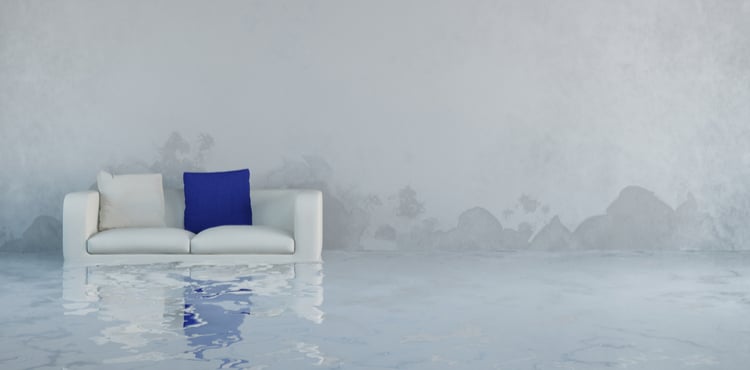9 tips for preventing water damage at your business

Water and freezing damage account for 15 percent of all small business property damage and liability insurance claims, according to The Hartford. It estimates that 75 percent of losses [PDF] from water damage are related to plumbing, HVAC systems, and appliances.
While commercial property insurance offers financial protection for a variety of water damage claims, you’re better off trying to avoid this problem to begin with. Water damage can ruin your carpets, drywall, inventory, and equipment. It can cause mold growth and structural damage. It might even force you to relocate or close your business for a while.
However, there are several methods small business owners can pursue to help prevent such complications. Follow these nine steps to help mitigate the effects of water damage on your business:
1. Seal cracks and gaps
Seal any cracks, holes, or other gaps in your building’s exterior and foundation to keep cold air from entering the building. This is especially important if these gaps expose your pipes to freezing temperatures. Caulk, weather stripping, spray foam insulation, and other sealants can be used to make your building more energy efficient and reduce the risk of pipes bursting during the winter.
2. Insulate exposed pipes
Exposed pipes are vulnerable to freezing when the temperature drops in the winter, especially at night. Frozen water in a poorly insulated pipe creates pressure, which can cause the pipe to burst. This could lead to costly flooding or even structural damage. You can reduce the chance of this occurring by wrapping the pipes with insulation available at most hardware stores.
3. Keep heat at sufficient levels
To prevent pipes from freezing, you’ll want to keep an eye on your business’s thermostat. Make sure the thermostat is never set lower than 50 degrees – even on weekends or when the building is vacant. Avoid significant changes between nighttime and daytime temperatures, which increases the risk of your pipes freezing. Be sure to regularly replace batteries in thermostats to ensure they’re operating correctly.
4. Inspect gutters and drainage
Fallen leaves and other debris in gutters and downspouts can lead to water damage of the exterior and interior walls in a building. Regularly inspect your business’s gutters, downspouts, and drainage system, and remove any debris or buildup. Have gutters professionally cleaned on a regular basis to keep water draining properly and away from the building.

5. Clear your roof
Snow and ice accumulation on your business’s roof can result in weakened roofing materials and create “ice dams,” which prevent melted ice and snow from properly draining. Regularly remove snow and ice from your business’s roof to prevent structural damage. Know your roof’s load-bearing capacity, and periodically check to ensure that snow and ice aren’t accumulating beyond its weight limits.
6. Maintain and inspect your HVAC and sprinkler systems
HVAC, plumbing, and sprinkler systems are leading causes of loss in commercial buildings, and even a small water leak can result in huge problems. Regular inspections can help prevent a property loss and expensive cleanup.
7. Locate your shut-off valve
If a pipe breaks, you’ll need to act quickly. That means you should know the location of the main shut-off valve for your building’s water supply. Shutting off the main valve will temporarily cut the flow of water to the building, preventing flooding until you can fix the problem.
8. Keep track of valuable items
Knowing the value of items in your building will help you replace them in the event they’re damaged by a water-related incident. If there’s a risk of flooding, move valuable items from the floor of your business – as long as you don’t put yourself at risk while doing so. If flooding does occur, you’ll need to ensure that the building has been safely evacuated and that all employees and customers are able to get to higher ground as soon as possible.
9. Get the right kind of business insurance
It’s important to include the right commercial water damage coverage as part of your risk management plan. When it comes to small business insurance, the details of your property coverage matter.
Commercial property insurance policies, sometimes referred to as business hazard insurance, may be able to cover some water damage claims such as the cost of pipe breakage. Often though, they will exclude coverage for damage from external flooding, groundwater, and backed-up sewer lines. Many policies also have exclusions for mold-related damage.
In many cases, you can buy endorsements (or “riders”) to your property policy to enjoy additional coverage. Your insurance agent can give you a better idea of which riders are available to you and what your policy covers.
If your business has to close because of flooding or water damage, business interruption insurance can help offset your loss of business income and cover your rent or relocation costs.
You might also consider commercial flood insurance, which covers the cost of water and flood damage, especially if you’re in an area at risk of flooding.
Find insurance from trusted carriers with Insureon
Complete Insureon’s easy online application today to compare quotes for commercial property and other types of insurance from top-rated U.S. carriers. Once you find the right policy for your small business, you can begin coverage in less than 24 hours.
Desiree DeNunzio, Contributing Writer
Desiree is a writer and editor with a passion for bringing relevant content to readers. She's edited and written content for online and print publications such as Wired magazine, PCWorld, CNET News, and more.







